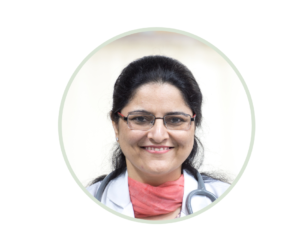If you’re pregnant, be wary of the many “pregnancy precautions” that’ll come your way. More often than not, they lack any scientific evidence.
Myth#1 Papaya and Pineapple Cause Miscarriage
One of the popular pregnancy precautions in India is to avoid Papaya and Pineapple in first trimester as it’ll result in miscarriage but there is no definite scientific evidence for or against it.
According to a study by NCBI, it was proved that ripe Papaya had no harmful effect on pregnancy. However, Papain in unripe Papaya when consumed in large quantities may result in miscarriages.
“There is nothing that points to harmful effects of Pineapple during pregnancy” adds Dr. Anita Sabherwal Anand.
Myth#2: Travelling in Pregnancy is Dangerous
Most pregnant women can travel safely with just little care and caution.
“You should schedule your planned trips during the second trimester as physical discomfort, morning sickness and nausea are the least in this period” advises Dr Anita.
The trick is to keep yourself well-hydrated, move around, carry home-cooked food and travel safe. If you’re on a long flight, walk around every 1-2 hours. Carry your maternity records and research the maternity care facilities in that area, in case of an emergency.
Read: Check out more precautions during pregnancy and facts about them!
Myth #3: Consumption of Ghee in Last Trimester Leads to a Vaginal Delivery
Of the commonly believed pregnancy precautions, many believe that eating ghee in the last trimester will lead to a vaginal delivery. But this is nothing but an old wives’ tale!
“There is no scientific evidence that proves that ghee when taken in huge quantities will lead to vaginal birth” informs Dr. Anita.
There however, are health benefits of ghee, and pregnant women should include it in moderation in their pregnancy diet chart but excess of it can lead to unnecessary weight gain or heartburn.
Myth #4: Doctors Can Tell You the EXACT Date of Delivery
“Labour is unpredictable – one cannot guarantee when it will start or how long it’ll take. As doctors, we can only estimate the Expected Date of Delivery (EDD)” points out Dr Anita.
There are two methods to estimate the EDD – one, is through the first date of your last period and second is, through an ultrasound done between 8th to 12th week of pregnancy
Usually, expectant mothers go into labour between 38 to 41 weeks. In case labour doesn’t start on its own after 41 weeks or if there are any complications, they may be advised induction earlier.
Myth#5: Abstain from Sex During Pregnancy
It’s safe to have sex during pregnancy but it’s also normal for the expecting woman to experience changes in her sex drive.
“As your body is going through many changes, it is normal for your sex drive to change during this period. You must discuss this with your partner and be open about your preferences” highlights Dr. Anita.
Intercourse during pregnancy should be avoided if the women has bleeding or any vaginal infection.
BONUS: Myth#6: Regular Antenatal Care will Prevent ALL Complications
“While regular care and tests during pregnancy can help with early detection and corrections of problems like anaemia and thyroid, there are certain complications that cannot be prevented” says Dr Anita.
Around 10-15% women may experience pregnancy complications like high blood pressure or high sugar in pregnancy, the adverse effects of which can be minimized with regular antenatal care and consultations.
Many age-old pregnancy precautions that elders’ swear by turn out to be myths with no scientific evidence.
“When in doubt, speak to your doctor to clarify any pregnancy precautions you may have been advised” concludes Dr Anita.
 This article has been written with Dr. Anita Sabherwal Anand, Consultant, Obstetrician-Gynecologist at Sitaram Bhartia Hospital in South Delhi. Dr. Anita is a highly qualified gynecologist with 20+ years of experience who is trusted by low-risk and high-risk mothers alike for her guidance on having a healthy pregnancy and delivery.
This article has been written with Dr. Anita Sabherwal Anand, Consultant, Obstetrician-Gynecologist at Sitaram Bhartia Hospital in South Delhi. Dr. Anita is a highly qualified gynecologist with 20+ years of experience who is trusted by low-risk and high-risk mothers alike for her guidance on having a healthy pregnancy and delivery.
Seek expert advice from our expert gynaecologist. Come in for an in-person consultation at our hospital in South Delhi. Please call on +91 9871001458 to schedule a consultation.


